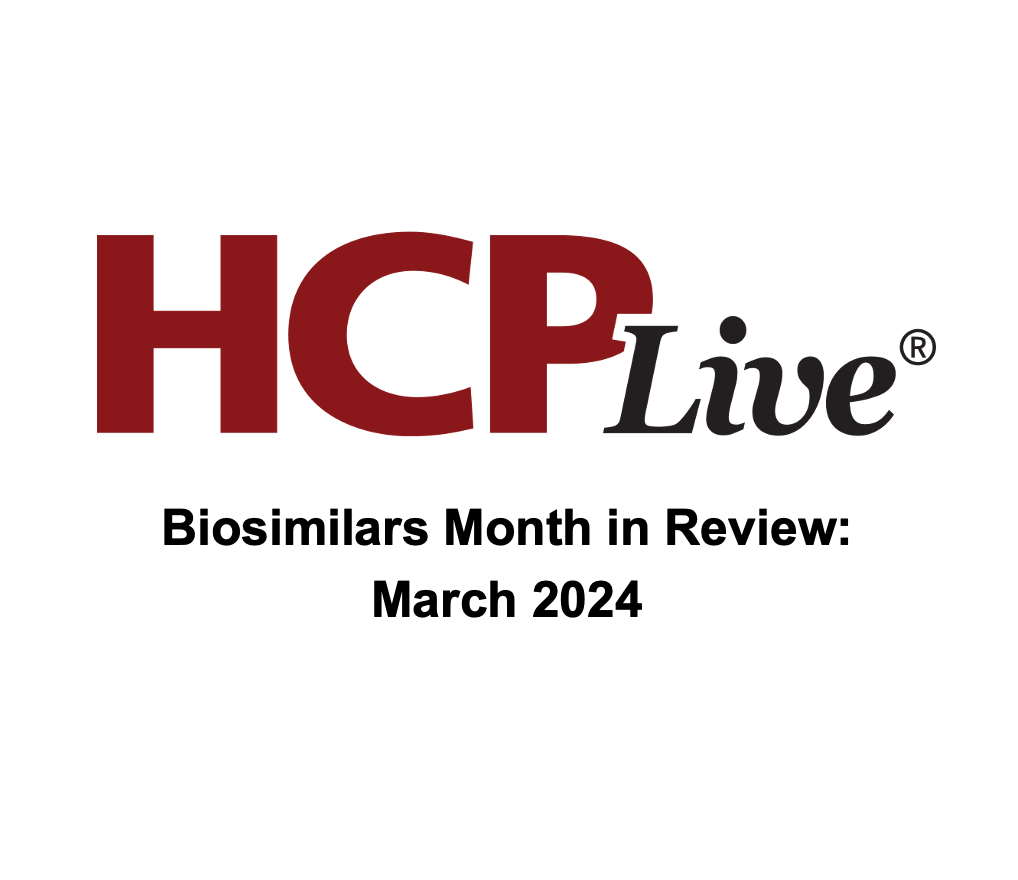News
Article
Biosimilars Month in Review: March 2024
Author(s):

In March, the US Food and Drug Administration (FDA) approved biosimilar versions of established biologic drugs for autoimmune diseases and skeletal-related events, adalimumab biosimilars demonstrated sustained efficacy and acceptance among patients, and affirmed CT-P41’s potential as an alternative treatment options in clinical practice.
Recent FDA Approvals
In March, the FDA approved biosimilar versions of well-established biologic drugs used in the management of autoimmune diseases and skeletal-related events. Both approvals underscore the FDA's commitment to expanding treatment options through biosimilar products while ensuring their safety and efficacy are comparable to the reference biologic drugs.
FDA Approves Biosimilar Tocilizumab-aazg for the Treatment of Autoimmune Diseases
The FDA approved the tocilizumab biosimilar, tocilizumab-aazg (Tyenne), for the treatment of a variety of inflammatory and immune diseases, including rheumatoid arthritis (RA), polyarticular juvenile idiopathic arthritis, systemic juvenile idiopathic arthritis, and giant cell arteritis. The drug is the first tocilizumab biosimilar with an FDA-approved intravenous and subcutaneous formulation and marks the third biosimilar approval for Fresenius Kabi.
The biosimilar, an interleukin-6 (IL-6) receptor antagonist, has currently been launched in more than 10 countries and will be available in additional countries in 2024 and 2025. It is offered in pen injector, vial, and prefilled syringe presentations.
FDA Approves Denosumab-bddz for Osteoporosis, Cancer-Related Skeletal Events
The FDA announced the approval of denosumab-bddz (Wyost, Jubbonti), the first FDA-approved, interchangeable denosumab biosimilars. The drugs are approved for all indications of the reference drug (Xgeva).
The approval decision was based on clinical studies demonstrating no clinically meaningful differences between the biosimilar and bio-originator. Both biosimilars have the same dosage form, dosing regimen, and route of administration as the reference product, a human monoclonal antibody developed to bind to the receptor activator of nuclear factor kappa-Β ligand (RANKL) protein.
Adalimumab Biosimilar Updates
These studies highlighted the continued expansion of biosimilar adoption and utilization in healthcare systems, as well as the assessment of their effectiveness and retention rates among patients. Data proved the sustained efficacy and acceptance of adalimumab biosimilars among patients over an extended period, further supporting their role in providing effective and accessible treatment options.
The US Department of Veterans Affairs Announces Adoption of Adalimumab-bwwd, with Jon Martin
The US Department of Veterans Affairs (VA) announced its exclusive selection of biosimilar adalimumab-bwwd (Hadlima) in replacement of the reference product, adalimumab, for the VA National Formulary.
In an interview with HCPLive, Jon Martin, US Commercial Lead, Biosimilars at Organon, discusses this decision and the potential implications on the pharmaceutical market and the broader landscape of biosimilar adoption in the US.
This initiative in the biosimilar market highlights a significant healthcare system advocating for structural changes that can positively impact the biosimilar market. Martin and his team anticipate more healthcare segments across the US to follow suit in the future.
Approximately Half of Patients Continued Treatment with Adalimumab Biosimilar ABP 501 at 1 Year
Among a cohort of patients with RA, psoriatic arthritis (PsA), and ankylosing spondylitis (AS), about half of patients receiving the adalimumab biosimilar ABP 501 remained on treatment at the end of month 12.
ABP 501 is the first adalimumab biosimilar approved by the FDA and European Medicines Agency (EMA) for the treatment of immune-mediated inflammatory diseases, such as RA, PsA, and AS, and has been available in Europe since 2018.
Efficacy, Similarity Among Biosimilars, Bio-originators
These data continue to showcase the similarities between biosimilars and bio-originators across various indications. These findings support the potential of biosimilars as an alternative treatment option with similar efficacy and safety profiles to the reference product and contribute to the growing body of evidence supporting the interchangeability and effectiveness of biosimilars in clinical practice.
Growth Hormone Somatropin is Effective, Does Not Increase Cancer or Diabetes Risk
A new study found the biosimilar recombinant human growth hormone (rhGH), somatropin (Omnitrope), is effective and well-tolerated in pediatric patients.
“No signs of an increased diabetogenic potential, increased risk of new or recurrent malignancies, or anti-rhGH antibody-induced lack or loss of efficacy has been observed across all the indications,” wrote a team of investigators led by Sandro Loche, MD, from Ospedale Microitemico.
Denosumab Biosimilar CT-P41 Demonstrates Pharmacokinetic Equivalence
A single dose of denosumab biosimilar, CT-P41, showed pharmacokinetic equivalence and comparable safety and immunogenicity among a cohort of healthy male Asian participants.
To evaluate the pharmacokinetic similarity of the biosimilar compared with the reference product, the double-blind, 2-arm, parallel-group, phase 1 study randomized healthy males 1:1 to receive a single 60 mg subcutaneous dose of CT-P41 or denosumab.
“Further studies to establish biosimilarity between CT‑P41 and US-denosumab include an ongoing phase 3 multidose study comparing efficacy, pharmacokinetics, pharmacodynamics, and safety in patients with postmenopausal osteoporosis,” investigators noted.





